Alexopoulos, T. & Fayant, M.P. (2016-2020 ; 48 mois) (ANR-16-CE39-003). Responsable : Théodore Alexopoulos (Université de Paris). Partenaires : LPS, Université de Paris (M.P. Fayant, N. Morgado) ; Université de Bordeaux (B. Subra) ; Université Aix-Marseille (G. di Liberti) ; University of Southern California (N. Schwarz). Montant : 283 439 euros.
Presentation
AN EMBODIED AND SITUATED PREJUDICE REDUCTION INTERVENTION TOOL (ESPRIT)
Theme 1: “Fundamental research related to the challenge” in relation to Theme 2 “Risks, management of crises of all types, resilience of systems”.
Abstract:
Europe and France are currently facing a major social crisis involving conflicts between various populations, religious communities and ethnic minorities that threaten the European foundational principles of fraternity and equality. This general context constitutes, therefore, a fertile ground for prejudice. Prejudice could take covert forms as spontaneous valenced thoughts (or reactions) about a target person that often operate nonconsciously and which represent powerful determinants of discriminative behavior. It is thus important to better understand how these spontaneous evaluations emerge in order to deal with social conflicts. In this project, we break with classical literature about prejudice and propose a research program that explores how the bodily nature of social interactions situated in an ecological context influence evaluations. More precisely, we conduct a fully embodied, situated and ecological study of evaluative processing. Specifically, we plan to systematically investigate the impact of embodied and ecological approach behavior toward others and assess its impact evaluation. We base our reasoning on grounded cognition models developed in the areas of philosophy and psychology that call for innovative procedures and experimental paradigms. For this reason we rely on technological advances in the domain of Virtual Reality Environments (VRE).
This project is conducted in line with open science and good practices guidelines (see https://osf.io/qz5hr/)

Consortium:
- Theodore ALEXOPOULOS (Université de Paris – Assistant Professor): Scientific coordinator with theoretical, methodological, and technical involvement.
- Marie-Pierre FAYANT (Université de Paris – Assistant Professor): Member. With theoretical, methodological, and technical involvement.
- Baptiste SUBRA (Université de Bordeaux – Assistant Professor): Member with theoretical, methodological, and technical involvement.
- Giuseppe DI LIBERTI (Université Aix-Marseille – Assistant Professor): Member with theoretical and methodological involvement.
- Nicolas MORGADO (Université de Paris – Assistant Professor): Member with theoretical and methodological involvement.
- Norbert SCHWARZ (University of Southern California – Professor): Member with theoretical and methodological involvement.
Virtual Reality
In this project, we rely on technological advances in the domain of Virtual Reality Environments (VRE). Doing so enable us to implement whole body ecological movements, while varying in parallel the contexts and situations within which the interpersonal interactions take place.
More precisely, we use a virtual reality head mounted display (Vive HTC ©).
The use of Virtual Reality in this project represents technical and innovative challenges that once tackled could advance our operative knowledge concerning the use of such technology in the study of human social interaction. We believe that such a tool open new research perspectives in the field in general by allowing behavioral scientists to expose participants to ecological variations while holding constant every other features of the context. This allows the assessment of ecological behavioral reactions during social interactions in controlled settings. Such advances are realized in close collaboration with developers (Reviatech ©: https://reviatech.com/ ).
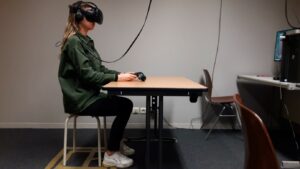
Examples of the virtual environment we use:

Communications & Publications
-
Papers
Nuel, I., Fayant, M. P., & Alexopoulos, T., (2019). “Science Manipulates the Things and Lives in Them”: Reconsidering Approach-Avoidance Operationalization Through a Grounded Cognition Perspective. Frontiers in Psychology. doi: 10.3389/fpsyg.2019.01418
-
Oral communications
- Nuel, I., Fayant, M. P., & Alexopoulos, T., (2019).Toward an embodied and situated view of social interaction: approach/avoidance behaviors and evaluative processes. Oral communication at the International Convention of Psychological Science (ICPS), Paris, March.
- Alexopoulos, T., Fayant, M. P., & Nuel, I., (2018). An Embodied and Situated Prejudice Reduction Tool. Poster session presented at the 11th Workshop Interdisciplinaire sur la Sécurité Globale, Lyon, France, September.
- Fayant, M.-P., Nuel, I., & Alexopoulos, T. (2018).The idiosyncrasy of approach effect on the self. Oral communication at the 20th European Social Cognition Network (ESCON) Transfer of Knowledge Conference, Cologne, Germany, September.
- Nuel, I., Fayant, M. P., & Alexopoulos, T., (2018).Toward an embodied and situated view of social interaction: approach/avoidance behaviors and evaluative processes. Oral communication at the 20th European Social Cognition Network (ESCON) Transfer of Knowledge Conference, Cologne, Germany, September.
- Fayant, M.-P., Nuel, I., & Alexopoulos, T. (2018).Isoler les effets des comportements d’approche: Vers un nouveau paradigme. Oral communication at the 12th Congrès International de Psychologie Sociale en Langue Française (CIPSLF), Louvain-La-Neuve, Belgium, July.
- Nuel, I., Fayant, M. P., & Alexopoulos, T., (2018).Vers une approche incarnée et située de l’interaction sociale: comportements d’approche-évitement et processus évaluatifs. Oral communication at the 12th Congrès International de Psychologie Sociale en Langue Française (CIPSLF), Louvain-La-Neuve, Belgium, July
- Nuel, I., Fayant, M.-P., & Alexopoulos, T. (2017). I approach therefore I am: Linking social information to the self via approach behavior. “18th EASP General Meeting”, Granada, July.
- Alexopoulos, T., Fayant, M. P., & Nuel, I., (2017). An Embodied and Situated Prejudice Reduction Tool. Poster session presented at the 11th Workshop Interdisciplinaire sur la Sécurité Globale, Paris, France,
- Nuel, I., Alexopoulos, T. et Fayant, M. P. (2017). I approach therefore I am: Linking social information to the self via approach behavior. Oral communication presented at the Colloque Jeunes Chercheurs of ADRIPS, Paris, June
- Fayant, M.-P., Nuel, I., & Alexopoulos, T. (2016) Approach behaviors and self-evaluation. Social Cognition Meeting, Université Grenoble Alpes, France, December.
News
Our latest article ! https://www.frontiersin.org/articles/10.3389/fpsyg.2019.01418/abstract
Our symposium at the International Convention of Psychological Science: “The Real Virtues of Virtual Reality in Social Cognition: The Case of Approach-Avoidance” with Juliane Degner, Andreas Eder and Ivane Nuel
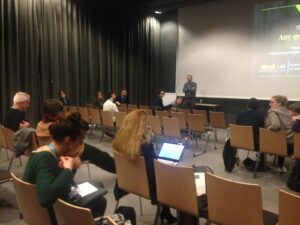
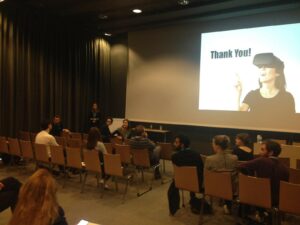
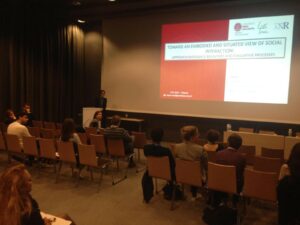
À lire aussi
Frédérique Autain (Université de Poitiers) : “Psychologie des classes sociales : un projet de réplication à grande échelle”
Lundi 17/06/2024 à 14h30 en salle 3035. © Résumé : Résumé : Des modèles théoriques en psychologie ont été développés pour comprendre comment la classe sociale façonne certaines façons de penser, de ressentir, et d’agir. Les expériences répétées des individus des...
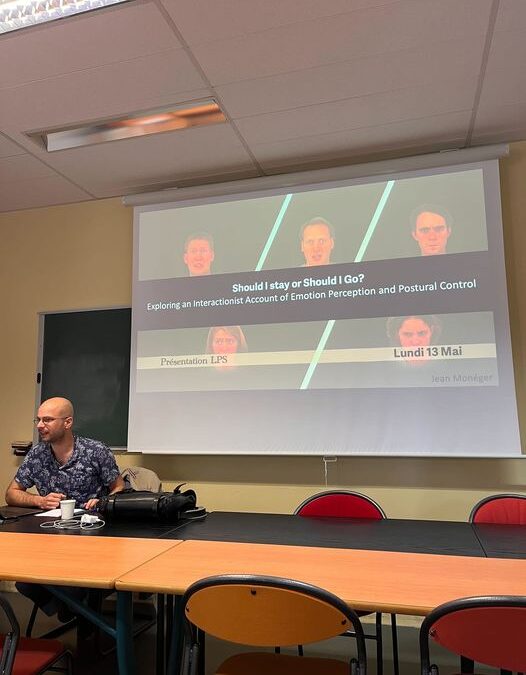
Jean Monéger (Université Paris Cité) : “Should I Stay or Should I Go? An Interactionist Exploration of Spontaneous Postural Behaviours Following Emotion Perception
Lundi 13 mai à 14h30 en salle 3035 © Résumé :Emotional facial expressions serve a communicative purpose, indicating behavioural intentions to others. Such social cues could prompt approach or avoidance of the perceived faces. However, the literature reports mixed...
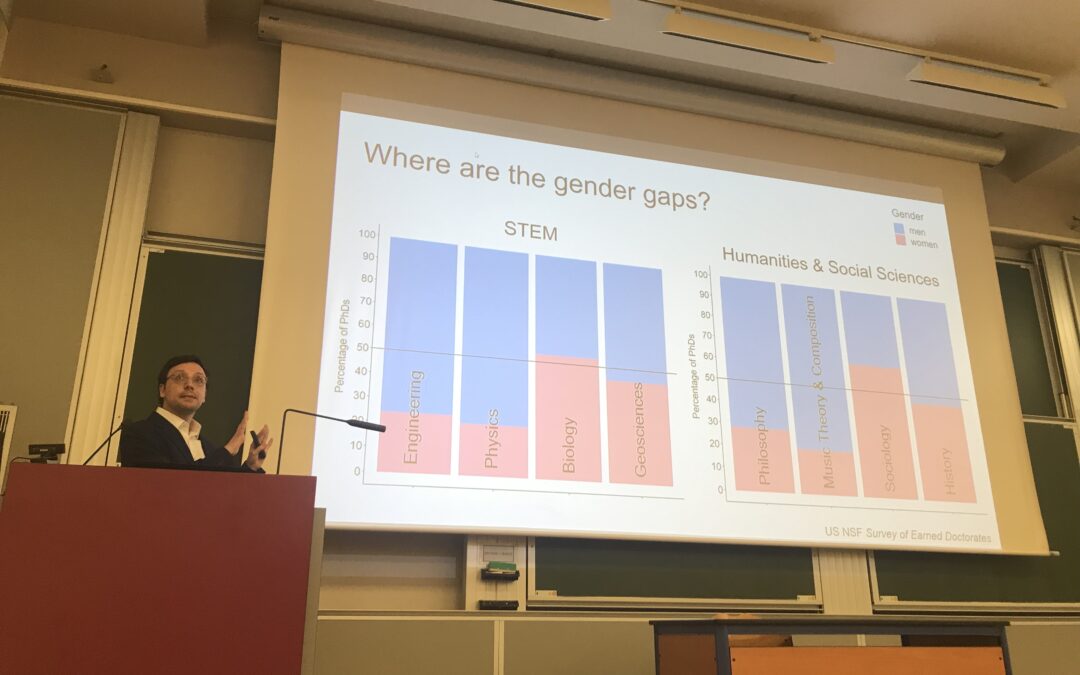
Accueil du Pr Andrei Cimpian(NYU) en tant que chercheur invité
Le LPS a le plaisir d’accueillir le Pr Andrei Cimpian (NYU) en tant que chercheur invité du 25 mars eu 8 mai. © Le Pr Andrei Cimpian (New York University, https://as.nyu.edu/faculty/andrei-cimpian.html) donnera une conférence le lundi 22 avril à 17h30 dans le cadre...
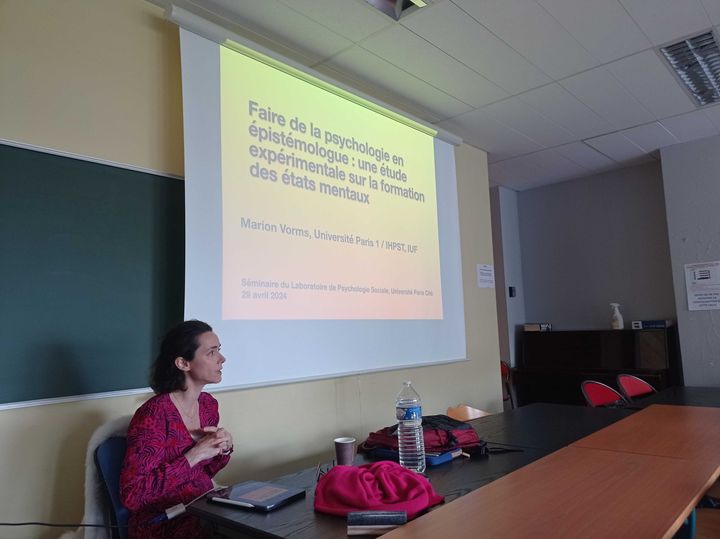
Marion Vorms (Université Paris 1 Panthéon Sorbonne) : “Faire de la psychologie en épistémologue : une étude expérimentale sur la formation des états mentaux”.
Lundi 29/04/2024 à 14h30 en salle 3035. © Résumé : Cet exposé présentera le protocole et les résultats d'une étude expérimentale que j'ai conduite avec une équipe de psychologues du raisonnement à Londres (Vorms et al, 2022). Elle vise à remettre en question la...
